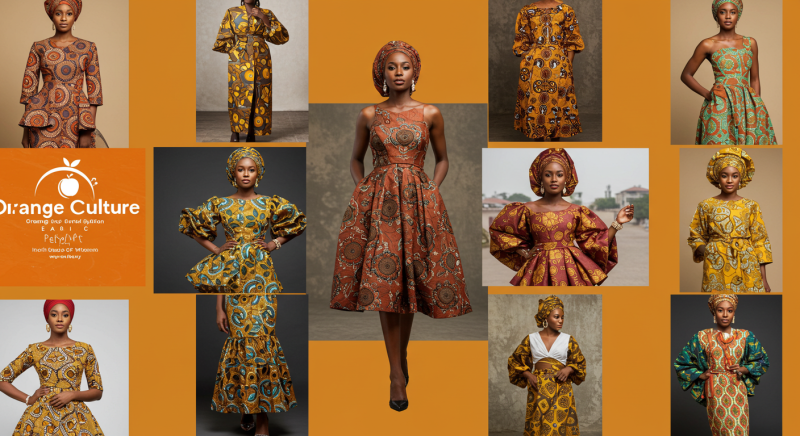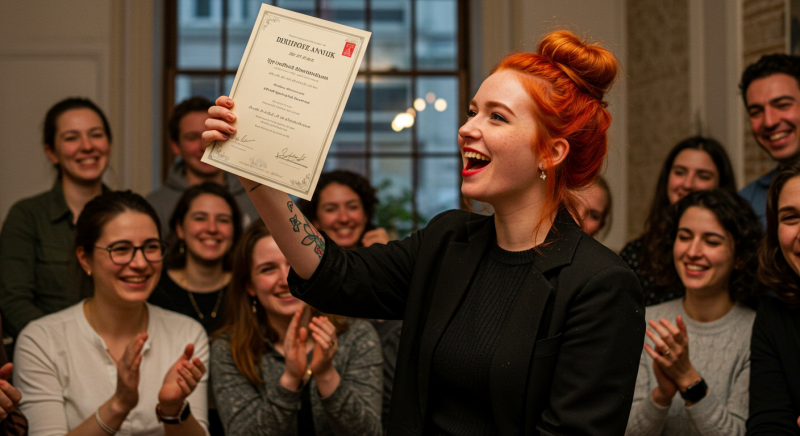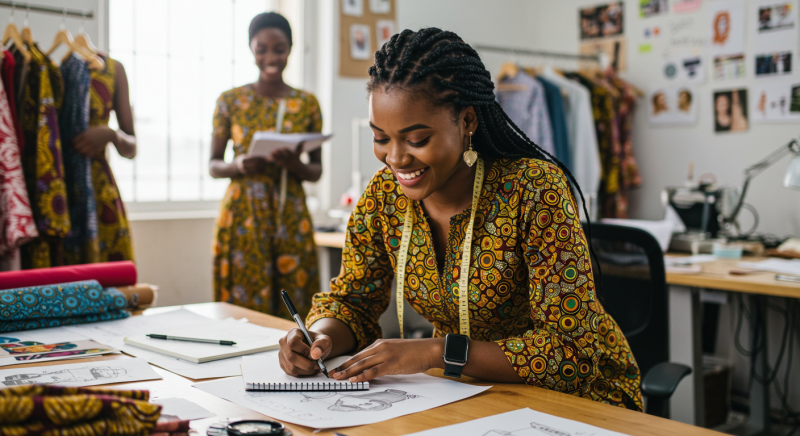Imagine pouring your heart into a unique logo or fabric design, only to see it replicated by a competitor who profits from your creativity. This nightmare became reality for Adeola, a Lagos-based designer whose signature Ankara patterns were copied and sold by a fast-fashion retailer. Her story is not unique. With Nigeria’s fashion industry contributing 6.1billion to the GDP and projected to grow to 15.5 billion by 2025, protecting intellectual property has never been more urgent. Trademark registration for Nigerian fashion brands is the shield that safeguards creativity, ensuring that innovators like Adeola thrive in a competitive market.
Key Takeaways
-
Trademark registration grants exclusive rights to logos, brand names, and designs, preventing unauthorized use.
-
Nigeria’s Trademarks Registry processes applications in 6–12 months, with costs ranging from 600to1,000.
-
Fashion brands must register under specific Nice Classification classes (e.g., Class 25 for clothing) for targeted protection.
-
Counterfeiting costs Nigeria’s fashion sector $3 billion annually, making legal safeguards critical.

Why Trademark Registration for Nigerian Fashion Brands Matters More Than Ever
The Nigerian fashion industry is a vibrant tapestry of creativity, weaving together centuries-old traditions like Adire dyeing and modern innovations in Afrocentric designs. Yet, beneath the colorful fabrics and global acclaim lies a pressing challenge: the theft of intellectual property. Trademark registration for Nigerian fashion brands is not just a legal step—it’s a lifeline for designers striving to protect their cultural legacy and economic future.
Consider this: Nigeria’s fashion sector contributes 6.1billion to the national economy, with projections soaring to 15.5 billion by 2025. However, counterfeiters drain nearly $3 billion annually from the industry, exploiting unprotected logos and designs. Without trademark registration for Nigerian fashion brands, creators risk losing control over their work. A designer’s signature pattern or logo can become a bestseller for copycats overnight, eroding brand trust and revenue.
Take the case of a rising Lagos-based label that discovered its logo replicated on mass-produced dresses sold in international markets. Because the brand had secured trademark registration, it successfully sued for damages and halted further infringement. Stories like this highlight why trademark registration for Nigerian fashion brands is non-negotiable. It grants exclusive rights to logos, brand names, and unique design elements, empowering creators to legally challenge imitators.
Beyond legal protection, trademark registration for Nigerian fashion brands builds credibility. Consumers increasingly seek authenticity, and a registered trademark signals quality and originality. For example, a study revealed that 68% of Nigerian shoppers are willing to pay a premium for brands with verifiable trademarks. This trust translates into customer loyalty and competitive advantage, especially in a market flooded with counterfeit Ankara prints and knockoff accessories.
The process also aligns with global standards. While Nigeria isn’t part of the Madrid Protocol, local trademark registration under classes like Nice Classification 25 (clothing) or 24 (textiles) ensures tailored protection. This specificity is critical—registering under the wrong class could leave gaps exploitable by counterfeiters.
Moreover, as e-commerce grows, trademark registration for Nigerian fashion brands becomes a shield against online piracy. Social media platforms and marketplaces like Jumia often require proof of trademark ownership to remove counterfeit listings. Without it, brands lose control over digital storefronts, where imitation products thrive.
In a nation where 65% of fashion businesses are small or medium-sized enterprises, trademark registration for Nigerian fashion brands levels the playing field. It allows startups to compete with established players, attract investors, and expand into international markets like the U.S. or Europe, where proof of IP ownership is mandatory for partnerships.
Ultimately, trademark registration for Nigerian fashion brands is an investment in sustainability. By safeguarding logos and designs today, creators ensure their work fuels Nigeria’s cultural narrative and economic growth for generations. As the industry marches toward its $15.5 billion milestone, protecting intellectual property isn’t optional—it’s the foundation of progress.
Step-by-Step Guide to Trademark Registration for Nigerian Fashion Brands
Embarking on the journey of trademark registration for Nigerian fashion brands is a strategic move to safeguard your creative identity in a competitive market. This process, though meticulous, ensures your logos, designs, and brand names remain exclusively yours. Here’s a detailed, conversational walkthrough to demystify each phase:
1. Conduct a Trademark Search: Lay the Foundation
Trademark registration for Nigerian fashion brands begins with a critical first step: ensuring your design or logo isn’t already claimed. Imagine crafting a stunning Adire-inspired logo, only to discover it’s already registered. To avoid this, visit the Trademarks Registry in Abuja for a manual search, as online databases are limited. Many designers overlook similar existing trademarks—like a logo resembling another brand’s font or color scheme—leading to rejection. Partnering with a local agent can streamline this process, as they navigate physical records and flag potential conflicts. Think of this search as mapping uncharted territory; it’s the groundwork that ensures your brand’s uniqueness stands unchallenged.
2. File Your Application: Assemble the Essentials
Once your design clears the search, filing the application becomes the next priority. Trademark registration for Nigerian fashion brands requires collaboration with accredited agents or legal practitioners, as self-filing isn’t permitted. Gather your Power of Attorney, a high-resolution representation of your logo or design, and applicant details. Picture this step as preparing a passport application—missing documents delay the journey. For instance, a blurred logo image could stall approval, so clarity is key. This phase formalizes your claim, transforming creativity into legal armor.
3. Examination by the Registry: Navigate Legal Scrutiny
After submission, the Trademarks Registry reviews your application under the Trademarks Act. Here, officials assess distinctiveness and compliance. A common pitfall? Generic terms like “Luxe Apparel” might be rejected for lacking uniqueness. Trademark registration for Nigerian fashion brands thrives on originality—think of your brand’s name as a fingerprint, irreplicable and deeply personal. If your application passes this phase, it moves closer to approval. If not, agents can help refine your submission, turning roadblocks into stepping stones.
4. Publication in the Trademarks Journal: Brace for Feedback
Approved applications enter the public eye via the Trademarks Journal, a two-month window inviting objections. Imagine your design on a community bulletin board—anyone can challenge its uniqueness. While most applications proceed unopposed, competitors might dispute similarities. Trademark registration for Nigerian fashion brands demands patience here. If objections arise, legal negotiations or adjustments may follow. This phase tests resilience but ultimately strengthens your claim, ensuring your brand emerges vetted and validated.
5. Certificate Issuance: Secure Your Legacy
Success culminates in receiving your trademark certificate, valid for seven years and renewable indefinitely. This document isn’t just paper—it’s a shield against copycats and a badge of authenticity. Renewals are straightforward but non-negotiable; let the deadline lapse, and your protection dissolves. Trademark registration for Nigerian fashion brands cements your place in the industry, enabling growth into global markets where proof of ownership is paramount.
Why This Process Matters
Navigating trademark registration for Nigerian fashion brands might seem daunting, but each step fortifies your brand’s future. From avoiding legal pitfalls to building consumer trust, this journey transforms creative vision into a protected legacy. As counterfeiters loom and markets expand, securing your trademarks isn’t just wise—it’s essential for thriving in Nigeria’s booming fashion landscape.

Costs and Timeline: Navigating Trademark Registration for Nigerian Fashion Brands
Understanding the costs and timeline for Trademark Registration for Nigerian Fashion Brands is essential for designers aiming to protect their creative assets without financial strain. While the process demands both time and investment, the long-term benefits far outweigh the initial effort. Let’s break down what you need to know to plan effectively.
Breaking Down the Costs
Trademark Registration for Nigerian Fashion Brands involves a mix of official fees, legal assistance, and administrative expenses. The Nigerian Trademarks Registry charges an official fee of approximately 80 for filing. However, this is just the tip of the iceberg. Most brands enlist accredited agents or legal practitioners to navigate the complexities of the process, adding professional fees ranging from 500 to $900. These experts handle critical tasks—from conducting trademark searches to drafting applications—ensuring compliance with the Trademarks Act.
Additional costs might arise during the journey. For example, if your application faces opposition during the publication phase, legal negotiations could add 200–500 in unforeseen expenses. Renewal fees, required every 14 years after the initial seven-year term, also factor into long-term budgeting. While the total cost of Trademark Registration for Nigerian Fashion Brands typically falls between 600and1,000, viewing this as an investment rather than an expense is key. Consider this: counterfeiters cost the industry $3 billion annually—far exceeding the price of securing your brand’s legal rights.
Timeline: Patience Pays Off
The timeline for Trademark Registration for Nigerian Fashion Brands spans 6–12 months for unopposed applications, though delays are common. The process unfolds in stages:
-
Trademark Search (2–4 weeks): Agents manually comb through records in Abuja to ensure your logo or design isn’t already claimed.
-
Application Review (3–5 months): The registry examines your submission for uniqueness and compliance. Applications with vague terms like “Premium Designs” risk rejection, necessitating revisions.
-
Publication & Opposition (2 months): Once approved, your trademark is published in the Trademarks Journal. This “public scrutiny” phase invites challenges, though most pass uncontested.
-
Certificate Issuance (1–2 months): Final approval grants a seven-year certificate, renewable indefinitely.
Delays often stem from incomplete paperwork or administrative backlogs. A Lagos-based designer recently shared how missing a notarized document added three months to their timeline. Proactive preparation—such as securing high-resolution logo files and agent agreements upfront—can streamline the process.
Why It’s Worth the Wait
While the timeline for Trademark Registration for Nigerian Fashion Brands may test your patience, the payoff is invaluable. Imagine launching a new collection knowing your designs are legally shielded from copycats, or expanding into international markets with proof of ownership. The process not only protects revenue but also elevates your brand’s credibility. Consumers associate registered trademarks with authenticity, often justifying higher price points.
Budgeting Tips for Success
-
Allocate funds for potential oppositions or revisions.
-
Partner with reputable agents to avoid costly errors.
-
Mark renewal dates on your calendar to maintain uninterrupted protection.
In Nigeria’s fast-growing fashion sector—poised to hit $15.5 billion by 2025—Trademark Registration for Nigerian Fashion Brands is a strategic step toward sustainability. By budgeting wisely and embracing the timeline, you transform legal hurdles into stepping stones for long-term success.
Common Challenges and Solutions in Trademark Registration for Nigerian Fashion Brands
Navigating the path of Trademark Registration for Nigerian Fashion Brands is not without hurdles. From counterfeiters lurking in bustling markets to gaps in legal knowledge, designers face obstacles that threaten their creative and financial futures. Here’s a deep dive into these challenges—and actionable solutions—to help brands safeguard their intellectual property effectively.
Challenge 1: Rampant Counterfeiting in Informal Markets
Nigeria’s vibrant open-air markets, like Balogun in Lagos or Wuse in Abuja, are hotspots for counterfeit fashion goods. Unscrupulous traders replicate popular logos and Ankara patterns, flooding the market with cheap imitations. For instance, a designer’s signature sequined gown might appear in stalls within weeks, priced at a fraction of the original. This undermines brand value and erodes consumer trust. Trademark Registration for Nigerian Fashion Brands provides a critical defense here. Once registered, brands can collaborate with enforcement agencies to conduct raids, seize counterfeit stock, and pursue legal action. Proactive monitoring of markets and online platforms like Instagram or Jumia further strengthens this shield, ensuring copycats face consequences.
Challenge 2: Limited Awareness of Intellectual Property Rights
Many Nigerian designers, particularly emerging talents, prioritize creativity over legal formalities. A survey revealed that 70% of small-scale fashion entrepreneurs believe verbal agreements or social media recognition suffice to “protect” their work. This misconception leaves logos and designs vulnerable to theft. Trademark Registration for Nigerian Fashion Brands addresses this gap by embedding legal literacy into the industry’s fabric. Workshops hosted by industry associations, such as the Fashion Designers Association of Nigeria (FADAN), educate designers on the long-term benefits of registration. Simplified guides in local languages and mentorship programs further demystify the process, transforming skepticism into proactive participation.
Challenge 3: Cross-Border Protection Complexities
As Nigerian fashion brands like Orange Culture and Lisa Folawiyo gain global recognition, international trademark protection becomes essential. However, Nigeria’s absence from the Madrid Protocol—a system streamlining global IP registration—forces brands to file separately in each target country. This multiplies costs and administrative work, deterring many from expanding. Trademark Registration for Nigerian Fashion Brands domestically is the foundational step here. With a local certificate secured, brands can prioritize key markets like the U.S., U.K., or South Africa, filing through each nation’s IP office. Partnering with global IP firms that offer bundled rates for multiple jurisdictions also eases the financial burden, turning cross-border growth from a pipe dream into a strategic reality.
Challenge 4: Administrative Delays and Bureaucracy
The Trademarks Registry in Abuja often grapples with backlogs, stretching timelines beyond the typical 6–12 months. Missing documents, like unsigned Powers of Attorney or low-resolution logo files, exacerbate delays. One Abuja-based designer shared how a misplaced form postponed their certificate by five months. Trademark Registration for Nigerian Fashion Brands demands meticulous preparation to avoid such pitfalls. Accredited agents play a pivotal role here, pre-checking submissions and following up with registry staff to expedite approvals. Digital tools, such as cloud-based document trackers, also help brands stay organized and responsive throughout the process.
The Way Forward
While challenges in Trademark Registration for Nigerian Fashion Brands persist, solutions are within reach. Combating counterfeiting requires vigilance and legal muscle, while education bridges the awareness gap. Cross-border ambitions demand strategic planning, and bureaucratic hurdles call for precision and patience. By viewing Trademark Registration for Nigerian Fashion Brands as both a shield and a growth catalyst, designers can transform obstacles into opportunities. As the industry marches toward its $15.5 billion milestone, overcoming these challenges ensures that creativity—not copycats—drives Nigeria’s fashion renaissance.

Conclusion
Trademark registration for Nigerian fashion brands is not just a legal formality—it’s an investment in longevity and credibility. As the industry surges toward $15.5 billion by 2025, protecting logos and designs ensures that creativity fuels economic growth, not exploitation. Start your registration journey today to secure your brand’s future.
FAQ
-
How long does trademark registration take in Nigeria?
Typically 6–12 months if unopposed. -
Can I trademark a fabric design?
Yes, under Class 24 (Textiles) or Class 25 (Clothing) of the Nice Classification. -
Is a business name registration enough?
No. A Corporate Affairs Commission (CAC) business name only offers limited protection. -
How do I enforce my trademark rights?
File infringement lawsuits in Federal High Courts or issue cease-and-desist notices.
read more
External Resources
